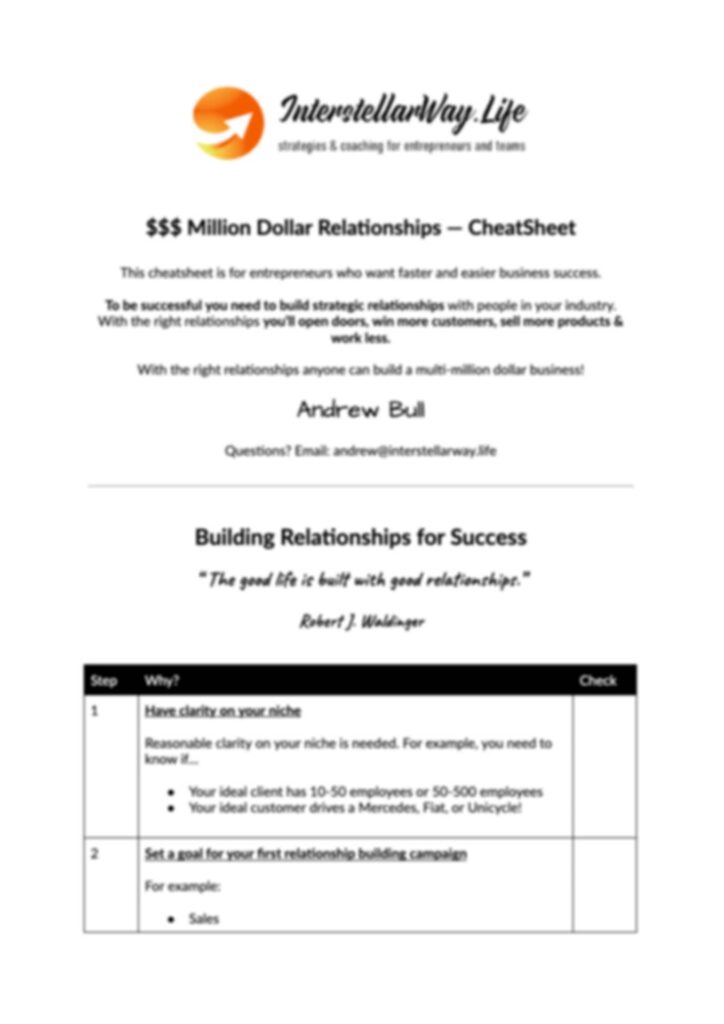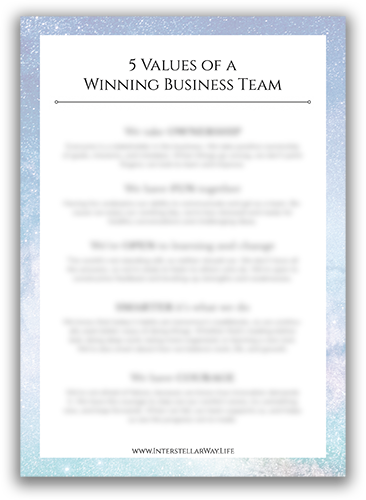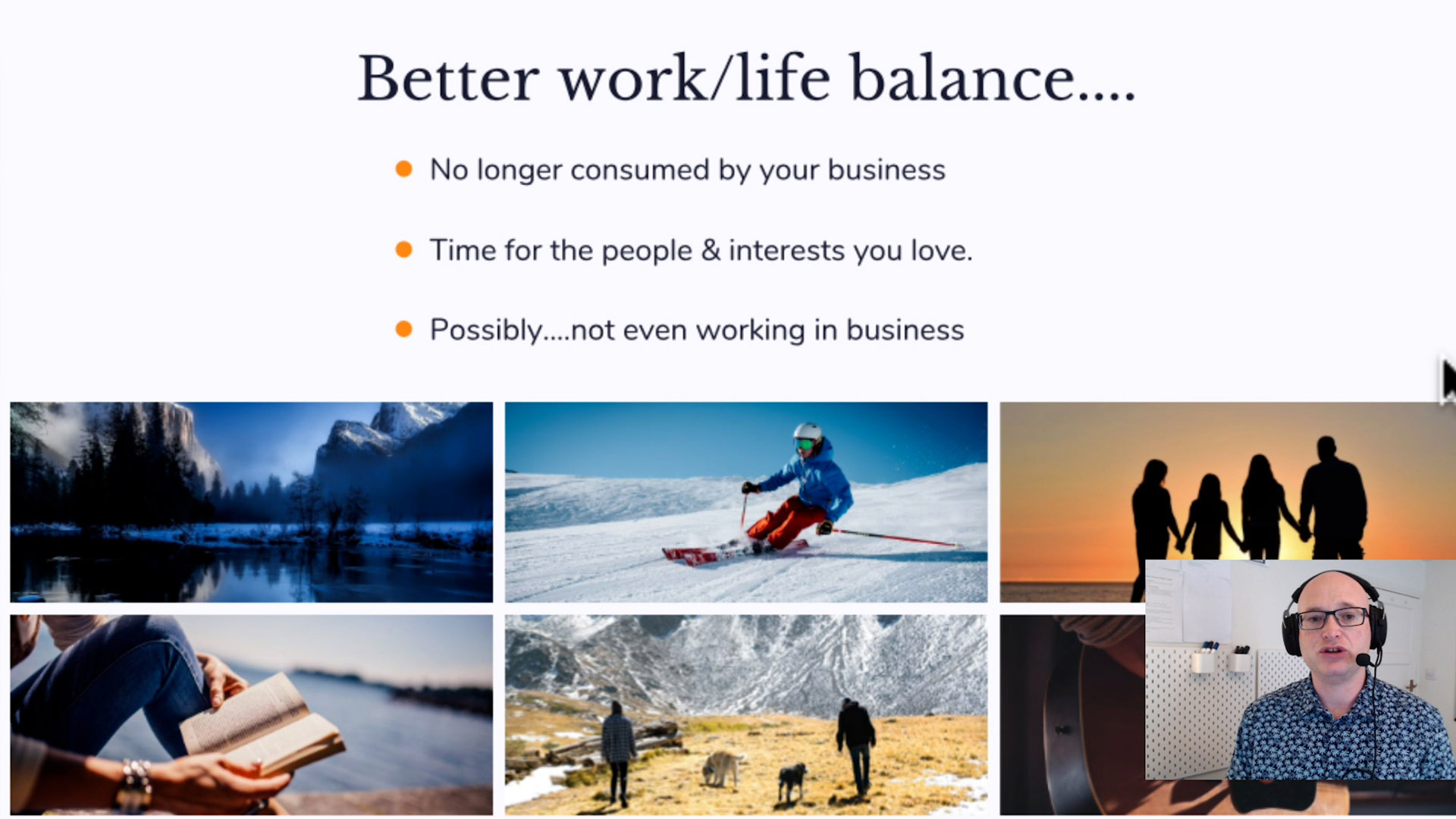Interstellar Business Show
Podcast for Technology CEOs and their teams.
It's time to grow your mind, elevate performance, and own your future 🚀

Interstellar Business Show
Episode: 0030
Theatre & talent retention: Katie McLaughlin on empathy and leadership
Featuring....

Episode Introduction
How much empathy do you have as a leader?
Do you really understand the perspectives of team members?
Or do you sometimes find yourself jumping to the wrong conclusion?
Well, if you struggle with empathy I don’t blame you…
In our busy world…
it can be hard to find the time to listen or think about other people’s perspectives on important topics.
However, it doesn’t have to stay that way…
You can increase your empathy and become a better leader…
And my guest today is going to help you do just that…
In today’s show you will learn:
- How to retain more of your people without paying crazy wages
- Why the power drama can reduce the drama in your business
- How to improve your empathy and leadership superpowers
Now, before we get started with today’s show and meet our guest, please make sure you subscribe and follow us wherever you’re listening today. So you never miss an episode again.
Episode notes & resources
Find out more about Katie McLaughlin
Find and connect with our guest here…
WEBSITE: https://mclaughlinmethod.com/
LINKEDIN: https://www.linkedin.com/in/mclaughlinkatie/
Love this podcast episode? Please leave a review here
Listen to more episodes here: Interstellar.Show
Get Andrew’s free Resources for Tech companies with teams → https://bit.ly/2Ygyoij
Join Andrew’s Interstellar Community → https://interstellarway.life/sign-up-for-newsletter/
Transcript
Please note, this transcription is autogenerated, so there may be errors.
[00:00:00] Andrew Bull: How much empathy do you have as a leader?
Do you really understand the perspectives of team members?
Or do you sometimes find yourself jumping to the wrong conclusion?
Well, if you struggle with empathy, I don’t blame you.
In our busy world, it can be hard to find the time to listen or think about other people’s perspectives on important topics.
However, it doesn’t have to be that way.
You can increase your empathy and become a better leader. And my guest today is going to help you do just that.
In today’s show, you will learn how to retain more of your people without paying crazy wages.
Why the power of theater can reduce the drama in your business.
How to improve your empathy and leadership superpowers.
Now, before we get started with today’s show and meet our guests, please make sure you subscribe and follow us wherever you’re listening today. So you never miss an episode again.
Welcome to another episode of the interstellar business show.
Welcome Katie. I’m really pleased to have you here with us today.
[00:01:14] Katie McLaughlin: Thank you. I’m so excited to be here.
[00:01:16] Andrew Bull: Yeah, it’s great to connect with someone else who is so fanatical. Perhaps I could say about team and culture.
[00:01:24] Katie McLaughlin: I’d say fanatical, is that a fair assessment? I am on a mission to create happier, healthier workplaces.
[00:01:31] Andrew Bull: I mean, because it can create so much good in the world as well, having that goodness and happiness inside a business. So we’ll get into that a bit later. Can you tell us, who you are, what your role is or your title is Katie.
[00:01:45] Katie McLaughlin: Yeah. So I am the founder, chief strategist and transformation artist of McGlaughlin method. And this is a boutique consulting firm that I created in the last couple of years. And as part of my work, I work with leaders. I work with teams and I bring in my theater background into my history of working in the startup and tech world, uh, on the front lines with leaders, navigating all the challenges I fuse all of that together to help leaders develop the skills that they need in order to take their team and their company to the next level.
[00:02:20] Andrew Bull: That’s interesting that you say about theater because. Heard anyone talk about theater before, when it comes to team and culture. So I really want to learn some more about that. And I presume we’re not just talking about random improvised station, we’re talking about something more structured than that.
[00:02:38] Katie McLaughlin: Right. There’s definitely been more of a trend to bring improv into the workplace to promote creativity and of course, to build connections. But I bring in a specific application of an exercise called image theater to help us express some of the nuances that happen between teams and people. Without needing to have the language to describe the emotions or the things that come up for us when we have conflict or when we have times where we feel insecure, things like that.
[00:03:12] Andrew Bull: Well, let’s hold this idea for a moment because we are going to get more into this use of theater as a way of connecting emotions and people and teams together. Cause that sounds really interesting to me and I’m sure it will to our listeners as well, but before we venture down that avenue, I want to learn about Katie’s secret, which we’re going to do in the first segment of the show.
So in this segment of the show, our guests will share a secret or story about themselves. Something that may be has informed their approach or their expertise. What’s your secret Katie?
[00:03:52] Katie McLaughlin: Well, I’m known for teaching leaders about how to connect with their teams and with their people. And I think the most valuable experiences from actually leading people. And I think one of the biggest things that we all as leaders are trying to, um, Work against is our own insecurities, our own needs from our team.
And, you know, in the first time that I managed people, I found myself like my gut instincts being to micromanage. And I know I did because I wanted things done a particular way. And even though I’ve grown from that first experience of managing people, I find that that’s still kind of one of my go-to strategies that I have to be thinking about when I manage my team and ask myself, did I actually make it clear what my expectations were in this situation?
Because I don’t want to be someone who micromanages.
[00:04:49] Andrew Bull: Yeah. Cause micro-managing, , is very destructive as a force within the team. Right.
[00:04:54] Katie McLaughlin: Right. It’s it, it is really a place of control, uh, where we are trying to control the actions of our team. And none of us want to feel like we are being controlled by somebody else. It takes away our autonomy and it’s okay to have high standards as a leader, but it’s important that we don’t just force a particular outcome on our team.
[00:05:20] Andrew Bull: Also, there’s a point at which sometimes good is good enough, right? When eight out of 10 is the job over the line and spending a lover two weeks or a month, trying to get that extra 20%. It’s just not worth it in terms of business result or the emotional cost for your team over right.
[00:05:40] Katie McLaughlin: Right. I think if we’re striving for that extra 20%, it’s probably because we feel insecure about the outcome or we’re afraid of, or avoiding something else in our business. If we’re focusing so hard on that last 20%. It’s time for us to take a look at what things we’re avoiding in our business with our teams, maybe outside of work.
[00:06:03] Andrew Bull: Because it could be a symptom of other issues going on where we feel like we need to desperately exert control over one area of our life, which unfortunately, then. Impacts our team members and the people who, who work for us. So, yeah, Mike and micromanagement is something that I’ve struggled with.
And my background is actually in the film industry. So their perfectionism is something that’s actually very highly rated. So that’s, that was a real battle for me. Uh, as I set up my first business, To actually move beyond that and actually step back. But it’s so powerful when you can do that, right? When you can give the keys to your team members and say, look, this is the result you want.
If you can kind of get there, doing it your way with this budget, with these tools, then that’s great by me.
[00:06:52] Katie McLaughlin: You know, it’s interesting because I’d actually feel like this is where some of my theater background starts to come into play and my philosophy, because as a director, when you’re learning how to deal with. Uh, actors on stage. One of the Cardinal rules to never do is to give a line reading where you say the line.
With the emotions that you want the person to do, because all they’re then doing is mimicking you. They’re not actually finding the why behind doing that action. And so if we take all the acting and theater parts out of that, that’s the core of what it means to manage people that we need to help them understand the why.
And then let go of the exact. Delivery or maybe outcome that they’re going to be achieving and allow something even better potentially to come out of it.
[00:07:45] Andrew Bull: Because we might think the only way to knock down a building is with a wrecking ball, but maybe our team members have got five other ideas and some better, cheaper, easier funnel ways to do it as well.
[00:07:57] Katie McLaughlin: Yeah. Big ideas are not going to come from just a single source.
[00:08:01] Andrew Bull: I suppose micromanagement then is a barrier to innovation and the best ideas.
[00:08:07] Katie McLaughlin: Absolutely. And it’s also that barrier for people being able to fully express themselves as well. if, our leaders are expecting us to act, behave, perform in a specific, very specific way, that means that our leaders don’t want us to bring in our own unique, flavor, flair.
[00:08:27] Andrew Bull: Yeah. And that, yeah. So then the we’re talking about repressing people and their uniqueness and the unique values that they can bring to, uh, business as well. So I suppose this moves us quite nicely into your area of expertise. And would you say one of the things that you’re helping startups with is helping them make more of the unique traits of the people in their business?
[00:08:52] Katie McLaughlin: right. I believe. All of that uniqueness is what’s going to help propel businesses into the next big thing. It’s going to help them to be resilient in the face of change. And in order to deal with any of the challenges that we have with our people, we need to build some fundamental people skills.
Again, we need to not be afraid of emotions in the workplace. And the fact that as humans, we have emotions and we bring. A lot of baggage into the workplace from our past experiences, from our home lives. And all of that impacts the way we perform the way we interact with each other.
[00:09:30] Andrew Bull: So, what kind of transformation are you making possible for the startup companies that you work?
[00:09:36] Katie McLaughlin: So what is possible? Yeah. Decreasing the amount of turnover that you’re having with your teams. So when you, as a leader and your entire leadership team are able to relate to your team members, you’re able to help each of them express their unique ideas, culture background. They’re going to want to stay in a place where they feel appreciated, where they are using their skills and where they feel wanted and needed.
And when you feel wanted and needed and part of a group, you’re also willing to do what it takes to get the job done. You’re willing to push when it’s necessary and. When you don’t feel like that you are what you’re gonna want to look at the time of day, you’re going to say I’ve worked too many hours today.
I’m not going to do anymore. And you’re also going to say, I’m not getting the opportunities that I want here. So I’m out and in a world right now where it’s a employees market for new jobs and higher wages. We have to give them some other reason to stay than just a paycheck.
[00:10:47] Andrew Bull: Yeah. So it’s much more about the values in the business and the experience that someone can have inside the business, rather than just money.
[00:10:57] Katie McLaughlin: Absolutely.
[00:10:58] Andrew Bull: Because they’ve proven that once you get to a certain amount of revenue anyway, in terms of your personal salary to actually the effect of money starts to fall off. Anyway, once you’ve got a car, a house and you can afford to go on holiday ensure incremental. So those things are very nice, but the reality is to have less and less of an effect on, on people.
And actually it becomes about the experiences of their day and at work, which make a big difference and could be the difference between your company being chosen or not chosen, or someone staying with your business.
[00:11:35] Katie McLaughlin: Right. And I think that the tech world, the startup space is so exciting and very attractive to a lot of employees where. promise of a great culture, the promise of being able to do new and innovative things, but I’ve seen a lot of startups and tech companies fall down on those promises and it feels a lot more like the same culture where I don’t feel appreciated.
I am being micromanaged. Maybe I have a toxic leader who is kind of flip-flopping on their expectations, um, or greatly increases pressure kind of throughout the Workday and the work week. And so we really have to take another look at how well are we actually executing on what we’re what was trying to sell to our future hires.
And for most startups in most tech companies, we’re falling down, we’re not fulfilling that promise of a different kind of workplace.
[00:12:31] Andrew Bull: Do you think it’s very much a case that people get sold a dream when they apply for a job, and then they get their first couple of days there and shown around here’s your wonderful desk. Here’s a wonderful office, but then a month into it. They’re like, actually, maybe this isn’t quite the amazing dream job that I thought it was going to be.
[00:12:52] Katie McLaughlin: Absolutely agree. I used to.
refer to it in one of my first jobs at a tech startup, as that it was my job to sell people on the Kool-Aid. cause I was the trainer. I was the first person people saw. And when I no longer believed in that Kool-Aid that I was selling. That was when I knew I had to leave personally.
And I think a lot of employees are feeling that much earlier in their tenure at a company. And that’s why we’re seeing a lot of turnover and people aren’t staying past a year.
[00:13:23] Andrew Bull: Yeah, because they’re no longer prepared to put up with it, especially when there’s that many jobs around on the market as well. Right, let’s move on to the next segment of the show, which is called
In this segment, our experts and leaders share a bigger idea, something that will help you and your business grow, work and live smarter.
Katie, what’s the big idea that you want to share with our tech leaders.
[00:13:51] Katie McLaughlin: My big idea is that theater is the biggest tool missing from leaders toolboxes to help us relate to others, understand the perspectives of others, and to communicate more effectively with our teams and across our company.
[00:14:09] Andrew Bull: why do you think theater is so important? Aspect of it really sticks out to you as a tool or something to leverage, change and performance within a team.
[00:14:21] Katie McLaughlin: The core of theater is the act of observing ourselves and the.
act of taking action. And so if we. Start to develop that skillset of observing ourselves and making intentional choices, taking action. We’re going to come from the place where we are living out our values in the way that we lead, rather than acting from a habitual assumptive place where we’re not making any intentional choices about how we actually lead.
[00:14:54] Andrew Bull: that’s really interesting because actually it makes me think if you’re doing role play in theater at work, then are you recording some of the performances for people to review as a, as a method for them to reflect on their actions?
[00:15:08] Katie McLaughlin: Sometimes we record a role-play more frequently. What I’m doing is. I either stopped them in the middle of a role-play or the end of the role-play ask them to reflect back on their own performance, because what I’m trying to do is get them to change And shift their behavior in the moment. So starting to recognize as something toxic or something controlling is coming out of their mouth. I want them to start to stop that behavior and then immediately be able to shift it, so all of my role plays, all of my exercises are very active and interactive. And so it’s not your average. Role-play when coming into a workshop with me.
[00:15:51] Andrew Bull: And so you have like a mini theater environment. I suppose you have a stage with a couple of the team acting out there, a scene, and then you have other people observing. Is that how it was.
[00:16:03] Katie McLaughlin: I do that. Sometimes I usually do that later in my programming earlier in my programming, we, of course are playing some improv games to build that sense of community, that sense of trust. But most importantly, I bring an element of theater called image theater into my workshops where you use your body, your facial expressions to.
Express what’s really going on inside of you when a particular prompt is given. Like when you think about going into a one-on-one with a team member who’s not performing well, even just listening to that description. I imagine many of you are having a kind of emotional reaction, like, oh, I don’t want to go into that conversation.
Maybe you’re nervous about how are you going to approach this, or maybe you’re frustrated with that employee. Who’s not performing well. It’s important that. Express have a way to express that frustration. And we don’t have vocabulary largely to speak about our emotions. And so this theater method gives people another way to express some of those emotions.
And I have everyone in the group. Um, almost all of my programming is group programming. And so I have everyone respond to the same prompt at the same time. And it’s remarkable to see the similarities in people’s responses to that similar prompt. that does is it helps everyone to start to empathize with the experience of others and realize that their experience is not that different from other leaders.
[00:17:35] Andrew Bull: interesting. And tell me more about empathy. How important is empathy when it comes to team and culture?
[00:17:40] Katie McLaughlin: For me, empathy is the key to all of our problems in the workplace. Whether it’s diversity, equity, inclusion, belonging, all of those at their core is a desire and hunger for empathy and a desire and hunger for being understood appreciated. And so the more that we can start to empathize with our team members, the better we can make decisions that are. More informed that are in line with trying to improve the experience of our team?
members, rather than making choices that are only about profit revenue, amount of sales, et cetera.
[00:18:21] Andrew Bull: I suppose if we were even just to focus on the business side of things for a moment, if you’re not listening to your team members and understanding their challenges or things that they might be unhappy about, then you’re going to have more friction. In the smooth operation of your business anyway. And that’s, if we just look at things from the business bottom line, money perspective, without even thinking about why we should care about people.
So even if you’re one of those people who’s listening to this show and you’re like, well, my team just needs to get through the day. And if they survive it, as long as we’ve got the project over the line, it doesn’t matter. Well, no. You still need your team to be performing well for your projects to work out well.
And empathy is a key driver of that as Katie saying. So I think you make a brilliant point there.
What’s the big problem that’s being solved with this idea of your
[00:19:13] Katie McLaughlin: I think every company today is feeling the hurt of employee turnover. Employees have a buyer’s market. They have so much choice when it comes to employment that they’re likely to leave with the guise of looking for a better paycheck, but really they’re looking to be more appreciated.
And so it’s not just about how much are you paying your team members? It’s about what the quality of work experience and day-to-day is working for you as a leader, working for your company. Are they working on interesting things and are they able to use their skills and feel important?
[00:19:52] Andrew Bull: So if we’re looking to retain our team members more , and be more attractive, and I suppose it is important to be more attractive right now because everything gets reviewed and shared on. Everywhere now. So I’m sure if you’re a decent size company, there’s already some reviews about your business on some hiring websites where people are like, don’t go to X, Y, or Zed firm because they promise you everything.
And yeah, they’ve got a pool table with, they make you work till 10 at night and they work you like crazy and don’t do it. So I suppose these things really matter now. You know, your reputation as an employer really matters. How does theater tie back into helping companies have better reputations?
[00:20:39] Katie McLaughlin: So your reputation is based on the day-to-day experience that your team members have. And so that is the thing that ultimately needs to be improved. And the most important way that you as a leader can do that is through your actions. And so theater as a skill, is a way to understand that the perspectives of others around you might be different, but just because they are different doesn’t mean that you can’t connect with them.
When we think about an actor, part of your job is to form a character that has a really clear motivation. Everything that they do is spawned from an intention in that motivation. The other actors and other characters in the show also have motivations and intentions. They’re just as important to them as yours is to you and theater using this construct.
We can now take that example and say, okay, as a leader I have things that I’m very much trying to get from my team members. That is my motivation. That’s one of my intentions, but my team member also has intentions and motivations that are driving them. When I understand that I have a motivation and they have a motivation, then I can start as a leader to choose different tactics, to get them to perform that are more aligned with their motivations. I can help them to see the why behind my motivations. And then we start to actually work together as a team. Then we start to have cohesion, collaboration, and. the possibility of how your team member can contribute in a different way than they maybe are today.
[00:22:25] Andrew Bull: I love that. It’s a way to put a new perspective on relationships in your business. The different parts and roles are playing out. We can start seeing people, not as bad guys or good women and see them as our team members. Who’ve just coming at things from a slightly different area of the stage.
[00:22:45] Katie McLaughlin: Exactly. And I think we need the opportunity to sit and reflect about that, to kind of workshop some of these ideas. And also as a leadership team, we forget sometimes as leaders that we also have this team, we have these people around us who are also leading others and we can use them and leverage them to understand our people in a deeper way because they have different relationships than we do with our teams.
[00:23:12] Andrew Bull: What convention does your idea go against?
[00:23:16] Katie McLaughlin: What I see leaders hyper-focusing on is that business results are all that matters that all you need to be doing is driving profit, driving to those metrics, driving to sales. And instead I’m encouraging leaders to focus on the outcomes of their people. If your people are happy, if your people are performing, if your customers are happy, then the business results follow naturally from that, because you’re not having to force anyone to do anything they’re naturally going to want to work with you. They’re naturally going to want to work harder because they feel like their contributions are valued.
[00:23:56] Andrew Bull: Re-evaluating the bottom line for business is really important. I think , the world and business is changing. And I think. How people think about work is changing too. And it’s not just about the wage anymore.
And as we say, it’s about the experience and therefore those kinds of changing of values also got to change in the business as well. So if, if the employees aren’t just chasing down money in terms of their salary, then it kind of makes sense for a business to think about what it’s chasing down as well.
And those things don’t have to be competing against each other. It’s not the worrying about your team members and trying to make sure they’re happy is going to be in conflict with your business and having a profit. In fact, it can support it as well.
So how can CEOs take easy first steps with this big idea? How can we get going with theater? Do I need to run out to my local theatrical store and get some costumes and makeup and wigs right now? I definitely could do have a wig if you’re listening online and you’ve never seen my face. I’m very bald.
So yeah, I could do have a great wig. Uh, let me know that you can recommend anyone, Katie, but yeah. What are the first steps we need to get started?.
[00:25:13] Katie McLaughlin: I’m always about bringing fun into the workplace. So if, if this conversation inspires you to kind of have a fun dress up day with your team, go for it. Um, but most importantly, to start taking action to improve the employee, experience you as a leader, need to get clear on who you are, what motivates you and what your habitual responses are to different stimuli.
When do you feel triggered in the workplace? That is where we have to begin. And I think too many leaders think it’s about changing their team or changing certain experiences or pulling different checklist items out of the employee experience toolbox. But first start with you start with your skills. Then you can start to peel back the layer and look deeper than that. What are your assumptions? What are some of your biases that are coming into play? We all have them, every one of us, Andrew and I, we all have them.
[00:26:12] Andrew Bull: A hundred percent. I definitely do. And yeah, you have to challenge them all the time and just be aware of them forming and going on. It’s part of what happens inside our subconscious and part of our brain, trying to simplify the world around us for that very act of simplification is that. Frey reductive and reducing the environment and people around us from the sophisticated multifaceted, imperfect people that we all are to these bad people and good people, and just like really reductive, cheesy Hollywood action movie kind of scenarios, in our workplaces, which just, aren’t very helpful.
I want to go back to your first point there about triggered.
So, if we’re talking about leaders, understanding what triggers them. Can you just explain a little bit more what you mean by trigger? So people actually can get their teeth into that idea.
[00:27:11] Katie McLaughlin: Definitely. So I imagine that everybody can think. And experience where your team member didn’t do something you were expecting they were going to do. And you felt a flash of anger, a flash of frustration, a flash of some kind of extreme emotion. That’s an example of a time when you have been triggered, I kind of use the lowercase T trigger rabbit rather than a, a big capital letter T nobody has had to come out and directly, criticize you as a leader, which of course is a triggering experience, right?
These moments of being triggered can happen in our day to day. It can even happen when we feel like our team member has, has maybe challenged our authority. And so, you know, we have this expectation that as a leader, that people are maybe supposed to listen to us, uh, but in reality, we’re supposed to listen to them. And so whenever you have those moments of feeling insecure about being a leader, or you feel like your team members are working against you or any of those kinds of strong emotions, you’ve probably been triggered by some kind of stimuli. Something has happened. An observation, someone has said something to you. That is causing you to have a strong, emotional reaction and likely that emotion is not a place that you want to be taking action from when you’re frustrated, when you’re feeling insecure, you’re likely to lash out, you’re likely to get defensive. And those kinds of behaviors are not. What’s going to help your team members to perform their best.
[00:28:51] Andrew Bull: Because also when we get emotional and lose control of our emotions, we start losing control without influence as well. For a moment, if we get angry and lash out or work somehow violent, and I don’t mean in a physical. But just in a verbal way, like just do it, do what I’ve said and it maybe isn’t said maybe it’s written an EMA in an email or a slack message or something like this, then that isn’t actual lashing out on many acts of violence in some ways.
And you do lose your influence when that happens. Right.
[00:29:28] Katie McLaughlin: Definitely. And each of those little moments, those little acts of violence all add up and that’s what creates what an employee experiences as a toxic workplace. They’re feeling like no matter what they do, they’re going to get reamed out for it, or they’re going to be attacked for something.
And the other thing to keep in mind is that our team members are also bringing in baggage from any other past bad leaders. So the first time that you might lash out at somebody in an email. Might be really triggering for your team members and bring up all of their past experiences of, of their past leaders and doing the same thing. So as leaders, we really can’t afford to ever use some of those tools, uh, cause they’re not very effective tools.
[00:30:19] Andrew Bull: No, and they might work for a moment or one time, but they’re not sustainable. And you lose that influence. And like you say, that person who’s had a bad experience somewhere else is now like, oh, it’s just the same hair as it wasn’t my last place. And then their expectation is that every time they do something, they’re going to be nagged or moaned at all, or have some.
Lash, uh, coming no direction. So yeah, it with leaders really need to lead from the front with their own performance. So managing your emotions and being grounded in rationality is a really. Way of doing that, Katie. So thanks for sharing that with our audience. So yeah. Get in touch with your triggers and start having awareness at them.
I suppose, maybe having a diary might be a good, good way of doing that. Right. Start writing down during the day. First of all, uh, you know, I got mad because Susan was once again, 15 minutes late to work and then. I wrote her a nasty email, or maybe I deliberately undo under briefed her to make the rest of her day a living hell, uh, just to get back at her.
Right. So we need to, if we start logging this and the stuff and start being aware of it, we can start managing it in a bit more of a mature way. Would you agree with that?
[00:31:35] Katie McLaughlin: Definitely awareness is the key to change. and if we’re not aware that we have something to change, we’re going to just keep going on as if we always have. So you’ve got, I love that idea of keeping a diary, keeping it, keeping a log for yourself. Moments when you have felt triggered, even if you’re not capturing, here’s what I did because of that.
But if you went back and looked at all the times that you got triggered and throughout a course of a day, that’s going to be very telling for you about what types of experiences are frustrating for you as a leader. So you can start to make a different choice about how else would you like to respond in that situation?
[00:32:13] Andrew Bull: and perhaps then you could have a diary with three columns, right? The trigger, how you acted, and then what your new behavior will be infused.
[00:32:22] Katie McLaughlin: Yeah, I love it.
[00:32:23] Andrew Bull: Yeah. So that’s a really good way for taking action. So how does your business help CEOs action, theatre, and improving team and culture?
[00:32:35] Katie McLaughlin: So all of my programs include that theater component. And so, whether it’s me working with a group of leaders at that all work at the same company, or if I’m working with an entire team?
we’re looking at very real situations that they encounter in their day to day. We are role-playing things. We are looking at our habitual responses and actions and having an opportunity to even step into an image somebody else created.
So we can feel what it feels like to be in that person’s shoes. And that’s how we can start to fast track. Empathy is through experiences of stepping into someone else’s world that they create for us.
[00:33:17] Andrew Bull: which markets do you serve? Uh, you’re in Seattle. Do you serve the whole of America anywhere outside of america.
[00:33:24] Katie McLaughlin: My initial focus is all throughout the U S and tech companies and startups since most of my career was in the tech startup space, across a variety of industries. I really learned that the nuances of startup growth and a tech company’s growth and how that impacts different experiences of people.
So if you’re in a high growth mode and you don’t have the leaders to help support all of those brand new hires, I’ve been there and I can help you navigate those challenging experiences and how to make more intentional choices. So that way your culture can be sustained and continue to improve. Even when you’re hiring at an astronomical rate.
[00:34:06] Andrew Bull: Yeah, because sustainability is key, right? It’s all well and good. Uh, taking everyone down the pub or bar for people in America for a couple of drinks and having a good night. But if that’s just four times a year and the rest of the year, no, one’s really getting them on that. Well together, especially when there’s not alcohol involved, then maybe there’s a bigger thing that you need to work on in terms of improving your team and culture.
Right. Let’s move on to our next segment of the show
So in this segment of the show, our experts and leaders share their vision for their future.
Now, Katie, in your pre-show notes, you’ve spoken about how better and healthier teams can actually lead to happier families and communities. Can you explain and share a little bit more about that?
[00:34:57] Katie McLaughlin: Yeah. So this comes from my direct experience in the workplace. When I have been frustrated and beat down at work. I am more irritable outside of work. And I don’t want to give back to my community. And, and because I’ve seen that in just myself, I know that that’s also happening as a ripple effect for others, that when we come out of work and back into our home lives, and maybe we’re hoping that our home lives are going to be.
I shining beacon of hope when our workplace experience is dragging us down. And maybe we discover that our home life is not that shining beacon of hope. We’re likely to just keep being frustrated. Maybe we’re going to lash out at our family members and we’re going to lash out at our community members.
We’re not going to want to be considerate of others because we have some unmet needs. Or just cascading throughout the course of our day and our lives. And so we spent so much of our time at work and work has the possibility of being a place, I believe, as being an equalizer that no matter your background, no matter where you come from or what you look like that you have skills. Things that we need in the workplace. And if you had that experience day in and day out, you’re going to want to just keep sharing that with your company, with your family, and then you’ll have extra energy to spare to share that back with your community. Instead of just feeling like you’re always operating from an empty cup.
[00:36:49] Andrew Bull: Yeah. So workplace is actually having an important role to help the wider community be a healthier place as well. And I suppose in a way, when we finished traditional education, we’re not a school, college, or university anymore. If we’re going to improve as people and become better, more upstanding members of society, then our workplace is kind of have to feel the gap.
[00:37:16] Katie McLaughlin: Right, because we are at work so much and it takes up so much of our time, especially here in America, it takes up a lot of our, a lot of our week, we are looking for that work to fulfill a lot. We’re looking for it to. Give us inspiration to provide us with our livelihood, uh, and provide for our families.
if some of those needs aren’t being met, we’re just going to keep coming up empty and feel frustrated and not feel inspired.
[00:37:44] Andrew Bull: So what’s your really big vision for helping the world and its workplaces become happier and healthier. What steps do you think you can take to help the world do that?
[00:37:57] Katie McLaughlin: I know that at the core of our experience is one-to-one relationships. And so I believe that the more leaders that I can influence, the more leaders that I can work with and help them to develop a perspective at a pause. That’s going to cause that ripple effect. So when I work with an executive team at a company, they then can go influence the entire rest of their company and all the other leaders, all the other people below them.
Then when those people move on to another company, they’re then going to bring with them that sense of inspiration, that sense of collaboration and team in a way that is not being experienced throughout the course of our workplace. And so. I’m looking to work with one executive team at a time and continue to get to this snowball effect where more and more companies have this change in mindset.
This ability to listen to their people and their ability to treat their people as humans.
[00:38:59] Andrew Bull: I think that’s a fantastic vision and a very noble goal. And I wish you all the luck with making that a reality as well. Let’s move on to our final segment of the show.
In this final segment of the show, our guest will share the action steps that you can take. So you’re not just getting some theory and some information you’re getting insights that you can put into action today.
And what were the big takeaways that you want leaders to remember about your big idea?
[00:39:33] Katie McLaughlin: Ultimately culture starts with you. It is not in these events that you set up and those moments that you create in a moment in time, it’s about the day to day in between moments that your people have with you. And that if you are not intentionally building your culture, you are unintentionally creating a culture that you don’t actually want.
So you have to be thinking about culture every single day. And ultimately your actions always speak louder than your words. You could tell your team that they matter, but if your actions show otherwise, like we’ve talked about in this episode, They won’t believe any of the words that you’re saying. So focus on your actions, how are you interacting with them day to day?
What are you saying to them? And are you being that leader who can inspire, motivate and ultimately listens and cares about their people?
[00:40:31] Andrew Bull: So, Katie, can you remind us of the big result that tech leaders can get, if they start putting theater and empathy into their business and their teams
[00:40:42] Katie McLaughlin: Big result you’re going to get is you’re going to either stop or slow your high turnover, which means you’re going to have people staying for longer and you’re going to retain your best people.
[00:40:52] Andrew Bull: Sounds like a pretty good result to me. What kind of business leader wouldn’t want that to happen? if people want your help to get the big result, where can they go to learn more?
[00:41:02] Katie McLaughlin: My website is mclaughlinmethod.com and I have programs of all kinds. So whether you want help working with you and your team directly, or working across your entire leadership team, and in that early part of 2022, I’m also opening a leadership cohort program where individual leaders can purchase a seat to participate in my group program and don’t have to wait for their entire leadership organization at their company to be on board.
[00:41:33] Andrew Bull: That sounds like a very smart strategy and a great thing for leaders who just want to get involved as soon as possible.
Well, thanks for coming on the show today, Katie. I really enjoyed talking with you about team and culture and really appreciate your sharing, all your fantastic advice and ideas today with.
[00:41:52] Katie McLaughlin: Thank you so much, Andrew . I’ve had a great time.
[00:41:53] Andrew Bull: My thanks to Katie for sharing her expertise today. I certainly learned a lot. My big takeaway from our conversation. What’s the importance of empathy and being able to put ourselves in another person’s shoes.
The psychotherapist and philosopher. Alfred Adler famously said that. All problems are interpersonal relationship problems and I’m convinced he was right. Think about the amount of business deals that go wrong because of relationships rather than have a problem with technology or software, it’s always about the relationships. Isn’t it.
And then think about problems that we have at work. They’re often about communications. They’re not about technical things so much. They’re about how people talk about projects and tasks and, you know, the way that someone says something in an email and things like that. And of course, then we get friction because people can’t see each other’s perspectives. And then that’s when people really start to butt up.
Against each other. So just imagine how much stronger your business would be if your people got on better with each other and your customers. And the key to making that happen is empathy. So I recommend you reach out to Katie. If that’s something that you’re serious about improving within your business.
Now, before I wrap up today, I just want to say a quick word about my upcoming book, which is called the monsters of team performance. It’s a book that will help you elevate the performance of your team. You can join the wait list for this book at www.Interstellarway.life. Now, if you haven’t already done so hit that subscribe or follow button wherever you’re listening today.
And all I’ve got left to say is thanks for being here. Have courage own your future. Take action.







